 Your new post is loading...
 Your new post is loading...

|
Scooped by
Gust MEES
|
ABOUT THIS PROJECT
This is a robotic owl that looks around for cool people, and can tell whether you're happy or upset. If you're excited enough, he will eventually let you take a sticker (or other small giveaway). He's named Archimedes, after Merlin's familiar in TheOnceandFutureKing. Of course, it's also reminiscent of the cyborg owl in Blade Runner.
First up, if you don't know the Google AIY Vision Kit, check out the details here! This is the basis for the robot's smarts. The code for this project is coming soon.
It started when we were invited to contribute something to the Google booth at Bay Area Maker Faire. I took a really, really long time to figure out what to build—what it would look like, how it would animate, how it would dispense the stickers... in the end, I went with this cute and fairly challenging design.
This robot is versatile enough that I can bring it along to different events, such as the CODAME Artobots Festival and the Arm/Hackster Asia Tour (since the Raspberry Pi runs on an Arm chip, the Broadcom BCM2835). In other words, I can justify spending this much time on one project because I can re-use and iterate upon it. I'm also excited to have a sidekick in the office :)
Learn more / En savoir plus / Mehr erfahren: https://www.scoop.it/t/21st-century-learning-and-teaching/?&tag=Coding https://www.scoop.it/t/21st-century-learning-and-teaching/?&tag=Raspberry+Pi

|
Scooped by
Gust MEES
|
Machine learning can drive tangible business value for a wide range of industries — but only if it is actually put to use. Despite the many machine learning discoveries being made by academics, new research papers showing what is possible, and an increasing amount of data available, companies are struggling to deploy machine learning to solve real business problems. In short, the gap for most companies isn’t that machine learning doesn’t work, but that they struggle to actually use it.
How can companies close this execution gap? In a recent project we illustrated the principles of how to do it. We used machine learning to augment the power of seasoned professionals — in this case, project managers — by allowing them to make data-driven business decisions well in advance. And in doing so, we demonstrated that getting value from machine learning is less about cutting-edge models, and more about making deployment easier. Learn more / En savoir plus / Mehr erfahren: https://www.scoop.it/t/21st-century-learning-and-teaching/?&tag=machine+learning

|
Scooped by
Gust MEES
|
Everyday, there are 4 million blog posts, 100,000 news articles and 500,000 hours of video published on the Internet. A wealth of information and knowledge. A wealth of information and knowledge that is lost for most companies, at least for the most part.
Lost?
Step 1: content curation
Not entirely. Thanks to content curation technology, the Web can now be filtered. With content curation tools and platforms such as Scoop.it (among others of course), we can use more or less sophisticated ways to filter this huge amount of content that is published daily to zoom in on what matters to us. Good content curation technology is essential. It saves people a huge amount of time looking for content to share for marketing purposes or information that helps their organization make better decisions. And perhaps as importantly, without these filters, we would just be able to search – not discover. We would still find answers to what we don’t know but we wouldn’t know what we don’t know.
But until recently, all the solutions we’ve offered to deal with information overload – ours included – have revolved around the same basic idea: more – or more sophisticated – filters. Learn more / En savoir plus / Mehr erfahren: https://www.scoop.it/t/21st-century-learning-and-teaching/?&tag=Curation

|
Scooped by
Gust MEES
|
RegTech 2.0
During the first phase of RegTech, startups focussed more on the technology to drive compliance use cases and were less conversant with the nuances of the regulations in a holistic manner. This lack of understanding of regulatory complexities by
RegTech startups proved a significant challenge for banks wishing to work with them. RegTech firms in RegTech 2.0 are expected to collaborate more, with banks, regulators and domain experts, to
demonstrate their offerings’ success far more quickly.
Also, as offerings in the next phase evolve from niche propositions to broader compliance propositions, they are in far more need of active support from regulators and industry consultants.
The market of regulators and central banks around the world are also struggling with the data deluge and supervision of new entrants in the banking industry.
The entire lifecycle of policy making, enforcement and supervision is ripe for disruption with the use of advanced technology. Startups would need to be patient in handling the bureaucracy of state-run organizations and even longer sales cycles. Startups
would also need to improve their knowledge of regulators’ underlying objectives and demonstrate unambiguously how their solutions can help the regulators do a better job than the status quo.
Equipped with past learnings and strong support from regulators and governments across the world, RegTech 2.0 is at an inflexion point for a new era of efficient and effective compliance powered by technology.
Learn more / En savoir plus / Mehr erfahren: https://www.scoop.it/t/21st-century-learning-and-teaching/?&tag=blockchain https://www.scoop.it/t/21st-century-learning-and-teaching/?&tag=AI https://www.scoop.it/t/luxembourg-europe/?&tag=FinTech https://www.scoop.it/t/luxembourg-europe/?&tag=LHoFT

|
Scooped by
Gust MEES
|
Pine64 has released a budget-friendly single-board computer with the high-powered Rockchip RK3399 system on chip (SoC).
Available from around $60, the RockPro64 board comes in two flavors, either with the hexa-core RK3399 SoC or the RK3399Pro, Rockchip's first "artificial-intelligence processor". Unveiled at CES 2018, it combines a CPU, GPU, and neural-network processing unit (NPU).
As noted by CNX-Software, a number of RK3999-based boards have been released in the past week but, priced at around $200 each, they've been aimed at business customers rather than home developers.
The RockPro64 with 2GB of RAM will cost between $59 and $65 and will be available from March, while the RockPro64-AI will cost $99 but won't be available until August 1, according to Pine64. Learn more / En savoir plus / Mehr erfahren: https://www.scoop.it/t/21st-century-learning-and-teaching/?&tag=Raspberry+Pi

|
Scooped by
Gust MEES
|
The Optimistic Realists
Position: Digitization and intelligent machines can spur productivity gains that match previous technology waves. Productivity will advance rapidly in certain sectors and for high-performing companies. New jobs will be created, but intelligent technologies may exacerbate the trends of the recent past, in which demand rose for both high- and low-skill workers whose jobs could be easily automated, while demand for middle-skill workers fell. With no simple solutions, more research is needed into the true relationship between productivity, employment, and wages to uncover effective responses.
Three Actions for Shaping the Future
Use technology to augment human skills and reinvent operating models.
Take the opportunity to redefine jobs and rethink organizational design.
Make employees your partners in building the intelligent enterprise.
The debate over technology and jobs will rage on. Business leaders must follow this debate — and participate in it, too. And much more research is needed to fully understand the implications of intelligent technologies on work. In the meantime, companies that actively seize control of what can be done to prepare will position themselves to thrive in this exciting new era.
Learn more / En savoir plus / Mehr erfahren: https://www.scoop.it/t/21st-century-learning-and-teaching/?&tag=AI https://www.scoop.it/t/21st-century-innovative-technologies-and-developments/?&tag=AI

|
Scooped by
Gust MEES
|
Sept ans après la spectaculaire victoire de Watson, le superordinateur d’IBM, au jeu télévisé américain Jeopardy!, le buzz autour de l’intelligence artificielle ne faiblit pas. Cette technologie entraîne aujourd’hui des avancées spectaculaires, assorties de changements radicaux, dans des domaines aussi variés que la médecine, le marketing ou les transports. « Je peine à me figurer une industrie que l’intelligence artificielle ne va pas, à mon sens, transformer au cours des prochaines années. » affirme ainsi Andrew Ng, professeur en sciences de l’informatique à l’Université de Stanford, qui voit dans l’intelligence artificielle « la nouvelle électricité ». Un rapport du cabinet de conseil McKinsey paru en juin 2017 prédit que l’intelligence artificielle gonflera l’économie américaine de 126 milliards de dollars d’ici 2025. Learn more / En savoir plus / Mehr erfahren: https://www.scoop.it/t/21st-century-learning-and-teaching/?&tag=AI https://www.scoop.it/t/21st-century-innovative-technologies-and-developments/?&tag=AI

|
Scooped by
Gust MEES
|
The concept of Big Data is a relatively new one. It denotes the availability of vast volumes and sources of data, which were not available before. By itself, Big Data is powerful, and when combined with Artificial Intelligence and machine learning, the opportunities presented by this combination are just endless. As big data moves to the maturity phase, firms are now looking for ways to combine the scale of AI and the agility of Big Data processes to bring about an acceleration on the delivery of the much-needed business value.
The Power of Combining AI and Big Data
Most businesses are data-driven. As a result, firms with the right type and quantity of data has the upper hand over rivals. Convergence between AI and big data is promising. Firms can now access large volumes of broken down and categorized data by their usefulness. Traditional computer processors cannot process big data. Big data can best be processed by a GPU database, which has the flexibility needed to handle a significant amount of data of different types. Learn more / En savoir plus / Mehr erfahren: https://www.scoop.it/t/21st-century-learning-and-teaching/?&tag=AI https://www.scoop.it/t/21st-century-innovative-technologies-and-developments/?&tag=AI https://www.scoop.it/t/21st-century-learning-and-teaching/?&tag=Big+Data...

|
Scooped by
Gust MEES
|

|
Scooped by
Gust MEES
|
Did we learn nothing from Arthur C. Clarke's 1968 sci-fi epic, 2001: A Space Odyssey?
In the film, astronauts on a mission to Jupiter discover that the HAL 9000 artificial intelligence computer that controls and automates all functions on the spacecraft starts seriously glitching. The astronauts get worried, HAL gets paranoid -- yada, yada, yada -- HAL kills everyone on the ship.
Windows as a Service: What's it mean?
Microsoft's decision to unveil a subscription licensing model for Windows 10 for enterprises could be a
READ NOW
The moral of the story is that when lives depend on fully automated systems, it's a good idea to keep an eye on those systems anyway. (And if that's not the moral of the story, it should have been.)
How do you use something that's fully automatic, anyway? What is the responsibility of the "user"? Can we just hand over control to the bots?
Recent events in the news suggest that when it comes to using our automatic products and features, some people are doing it wrong. Learn more / En savoir plus / Mehr erfahren: http://www.scoop.it/t/21st-century-learning-and-teaching/?tag=Artificial+Intelligence http://www.scoop.it/t/securite-pc-et-internet?q=iot

|
Scooped by
Gust MEES
|
Do you think that robots with artificial intelligence could ultimately provide the expertise and multiple intelligences that we need from human experts?
It’s already clear that artificial intelligence can provide information that we used to secure from experts or that we had to look up ourselves. Just think about Siri, Encore, and the power of many other search engines. There is every reason to believe that these systems will continue to get ‘more intelligent’. As I am writing, the best “go” player in the world is struggling to compete successfully with a newly developed computational system.
I think we need to separate three issues. Firstly does the system reach its ‘answers’ in the same way that human beings do? This is the difference between ‘artificial intelligence’ and ‘human simulation. Secondly does the system manifest its intelligence? For many of us, there’s a big difference between typing a question on our pad, as opposed to conversing with a robot or avatar. The more that the robot resembles a human being, the more satisfying it will be to many individuals, although not to me! Thirdly can the computational system provide a recommended course of action that is as solid, or even more solid, than a well-trained professional? In a way that the client finds satisfying? For the foreseeable future (say a decade or two), I think that the answer is no. But I would add that for individuals who cannot afford to consult a professional, or for whom no professional is available, an artificial system will typically be much better than the recommendations of a friend or than common sense – which is all too often common non-sense. Learn more / En savoir plus / Mehr erfahren: http://www.scoop.it/t/21st-century-learning-and-teaching/?tag=Howard+GARDNER http://www.scoop.it/t/21st-century-learning-and-teaching/?tag=Ethics
|

|
Scooped by
Gust MEES
|
As you might expect, Brin expects Alphabet and others to find more uses for AI. But he also acknowledges that the technology brings possible downsides. “Such powerful tools also bring with them new questions and responsibilities,” he writes.
AI tools might change the nature and number of jobs, or be used to manipulate people, Brin says—a line that may prompt readers to think of concerns around political manipulation on Facebook. Safety worries range from “fears of sci-fi style sentience to the more near-term questions such as validating the performance of self-driving cars,” Brin writes.
All that might sound like a lot for Google and the tech industry to contemplate while also working at full speed to squeeze profits from new AI technology. Even some Google employees aren’t sure the company is on the right track—thousands signed a letter protesting the company’s contract with the Pentagon to apply machine learning to video from drones. Learn more / En savoir plus / Mehr erfahren: https://www.scoop.it/t/21st-century-learning-and-teaching/?&tag=AI https://www.scoop.it/t/21st-century-learning-and-teaching/?&tag=Ethics

|
Scooped by
Gust MEES
|

|
Scooped by
Gust MEES
|

|
Scooped by
Gust MEES
|

|
Scooped by
Gust MEES
|
Big Data is powerful on its own. So is artificial intelligence. What happens when the two are merged?
Big data is moving to a new stage of maturity — one that promises even greater business impact and industry disruption over the course of the coming decade. As big data initiatives mature, organizations are now combining the agility of big data processes with the scale of artificial intelligence (AI) capabilities to accelerate the delivery of business value. Big Data and AI at MetLifePete Johnson is one of the most experienced executives working in the field of big data and AI within industry today. Having worked in the field of artificial intelligence for a generation dating back to his academic career at Yale University, Johnson now leads big data and AI initiatives as a fellow at MetLife. Johnson previously held positions as senior vice president for Strategic Technology with Mellon Bank and served as the executive vice president and chief technology officer of Cognitive Systems Inc. (CSI), an early artificial intelligence company specializing in natural language processing, expert systems, case-based reasoning, and data mining. CSI was founded by several members of the Yale University faculty in 1981, when Johnson completed his MS in computer science. Johnson, whom I’ve known for over a decade, is a regular participant in a series of executive thought-leadership breakfasts that I host for senior industry executives to share perspectives on topics in big data, AI, and machine learning among their peers. Participants in the most recent executive breakfasts have included chief data officers, chief analytics officers, chief digital officers, chief technology officers, and heads of big data for firms including AIG, American Express, Blackrock, Charles Schwab, CitiGroup, General Electric (GE), MetLife, TD Ameritrade, VISA, and Wells Fargo, among others. As a long-suffering expert in the field of artificial intelligence, Johnson observes three critical ways in which big data is now empowering AI: - Big data technology — We have the ability now to process huge quantities of data that previously required extremely expensive hardware and software, or “commodity parallelism.”
- Availability of large data sets — ICR, transcription, voice and image files, weather data, and logistics data are now available in ways that were never possible in the past; even old “paper sourced” data is coming online.
- Machine learning at scale — “Scaled up” algorithms such as recurrent neural networks and deep learning are powering the breakthrough of AI.
Learn more / En savoir plus / Mehr erfahren: https://www.scoop.it/t/21st-century-learning-and-teaching/?&tag=AI https://www.scoop.it/t/21st-century-innovative-technologies-and-developments/?&tag=AI https://www.scoop.it/t/21st-century-learning-and-teaching/?&tag=machine+learning https://www.scoop.it/t/21st-century-learning-and-teaching/?&tag=Deep+Learning

|
Scooped by
Gust MEES
|
So how can AI help?
Communication: Students and teachers will be able to communicate instantly with one another as well as to connect with other forms of AI around the world. Students instantly paired with peers, helping each student to expand their own personal learning networks, with personalized and more authentic connections that will meet the students’ interests and needs at any given moment. Think of the benefits for being able to converse with AI or a virtual peer, which has been located based on an assessment of student needs and error analyses. Build foreign language skills, talk to someone about school, family, life in a country being studied, possibilities are endless for language learning.
Differentiation: With the availability of AI, students and teachers will be able to connect with resources they need exactly when they need them. The entire internet of resources accessible within seconds, deliverable to each student saving valuable time for more interaction between teacher and student, and students and students. Through AI, students can have access to one to one tutors, creating more authentic learning experiences by pairing students with an expert or a virtual peer to learn with. Think of the benefits if each student could have instant access to a tutor wherever and whenever they needed one.
Personalization: What better way to offer more personalized learning opportunities for students than to have AI be able to analyze student responses, determine areas of need and interest, and find resources or create new questions to help students to greater understanding of the content. What about the potential for informing the classroom teacher, and working together to create new learning opportunities for students, but in a faster way, that relates directly to the student needs and offers authentic and timely feedback.
Exploration: With the rise of augmented and virtual reality, and the benefits of bringing these into the classroom for students to have a more immersive learning experience and to see places and explore things that otherwise they would not, AI can be a tremendous benefit for this. Through AI, resources could be found instantly based on student responses, or for the entire classroom to experience. Capabilities such as these are not something that will be limited by the time and place of the classroom setting. AI could show students want they want to explore, find ways to bring the content to life instantly.
Assessments: AI could help teachers to assess students and streamline the grading process, with the added benefit of being able to quickly take the data, provide an analysis for teachers, so that time can be saved for more classroom interactions. It can help with student achievement, making sure that each student has the opportunity to learn and grow, benefitting from the faster responses through AI.
Learn more / En savoir plus / Mehr erfahren: https://www.scoop.it/t/21st-century-learning-and-teaching/?&tag=AI https://www.scoop.it/t/21st-century-innovative-technologies-and-developments/?&tag=AI

|
Scooped by
Gust MEES
|

|
Scooped by
Gust MEES
|
Jack Ma is optimistic about jobs in the age of AI and automation — but only if we start educating our children differently. Computers will always be better at calculating than we will, so we need to focus on service and creativity to be prepared.
“MADE IN INTERNET”
Jack Ma, founder and chairman of Alibaba, isn’t afraid of artificial intelligence (AI) or automation. Instead, he thinks we need to prepare in the right ways for the massive, disruptive changes these forces are precipitating.
“In the last 200 years, manufacturing [brought] jobs. But today, because of the artificial intelligence, because of the robots, manufacturing is no longer the main engine of creating jobs,” Ma said Wednesday at the Bloomberg Global Business Forum. “The service industry is going to be the main driver for job creation.”
ADAPTATION WILL CREATE JOBSMa’s not alone in this thinking; many experts feel that the way we currently teach children is ineffective, outdated,won’t prepare them for automation or STEM jobs, and renders higher learning inaccessible to too many. But when it comes to AI, Ma joins a debate that’s much more polarizing, with experts taking positions across the spectrum of opinion. Learn more / En savoir plus / Mehr erfahren: https://gustmees.wordpress.com/2015/05/26/what-are-the-skills-needed-from-students-in-the-future/

|
Scooped by
Gust MEES
|
Eric Schmidt, the executive chairman of Alphabet, says AI can be harnessed to help solve major challenges like climate change, food security, and many other problems in health care, energy, and other critical sectors. Machine learning algorithms can directly analyze thousands of previous cases of different types of diseases and make their own conclusions as to what constitutes a sick individual versus a healthy individual, and consequently help diagnose dangerous conditions including cancer. Also, the technology is being fed big data to help scientists understand and predict the effects of climate change. Learn more / En savoir plus / Mehr erfahren: http://www.scoop.it/t/21st-century-learning-and-teaching/?&tag=AI

|
Scooped by
Gust MEES
|
So where is this all going?
The Future of Education – Personalized, Perfect & Free (Thanks to AI and VR)
Right now, online platforms like Khan Academy and Coursera have made a plethora of educational resources available 1) for free and 2) on demand, such that you can pick and choose what you learn and at what speed you learn it.
Khan Academy has delivered over 300 million lessons since it started in 2006, features 5,000 free instructional videos in 65 languages, and allows users to complete 4 million exercises every day – simply amazing.
In 2011, Stanford professor Andrew Ng decided to put his machine learning course online for free, thinking that maybe a few additional people would tune in with his students. Within days, 100,000 people had signed up to take the course.
We are already seeing technology democratize access to education – but soon the education itself will become even more powerful with the help of AI and virtual and augmented reality.
In the near future, artificial intelligence will be able to personalize learning platforms to each individual student.
The AI will have unlimited access to information and will deliver it at the optimal speed to each student in an engaging, fun way.
Learn more / En savoir plus / Mehr erfahren: https://gustmees.wordpress.com/2016/05/19/a-holistic-view-of-what-will-influence-education-in-the-future/ https://gustmees.wordpress.com/2016/02/18/the-new-possibilities-to-learn-and-teach-with-ict/ https://gustmees.wordpress.com/2015/07/19/learning-path-for-professional-21st-century-learning-by-ict-practice/
|



 Your new post is loading...
Your new post is loading...

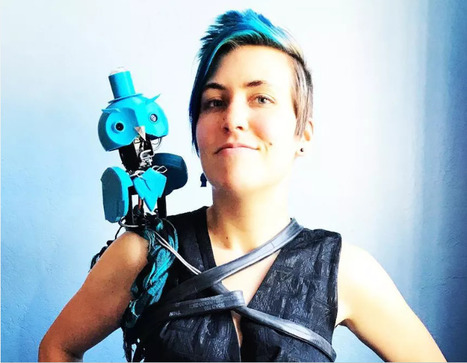



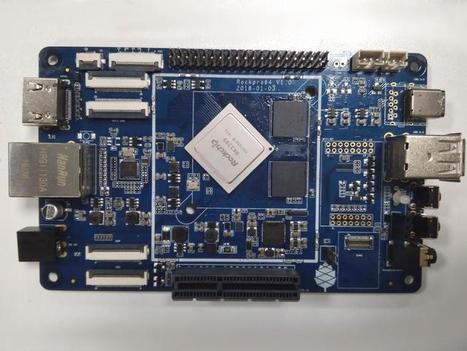


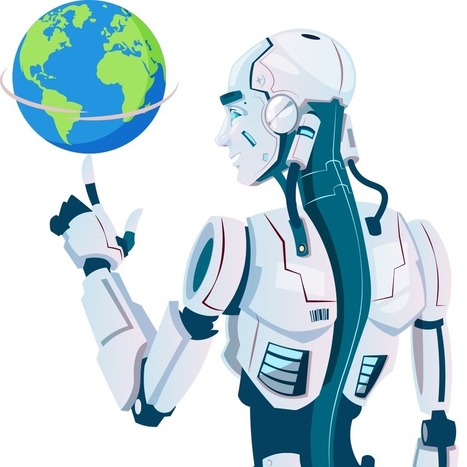

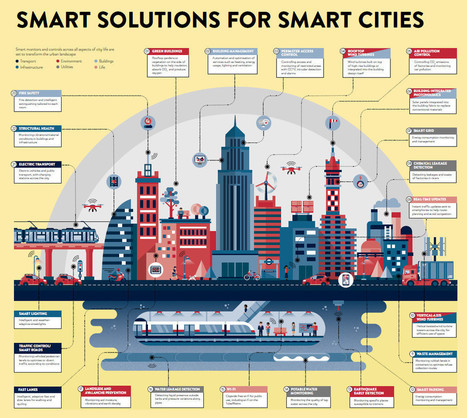
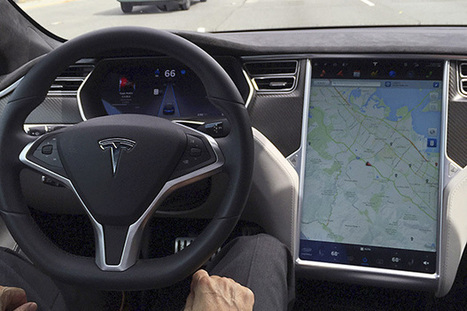


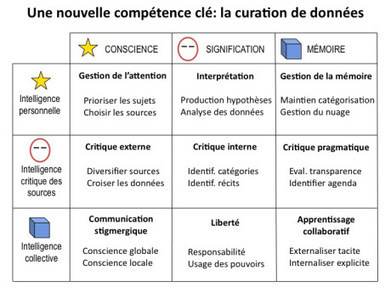
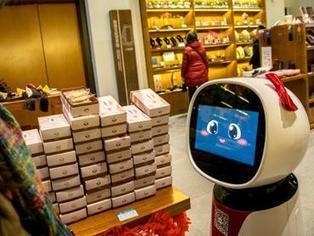
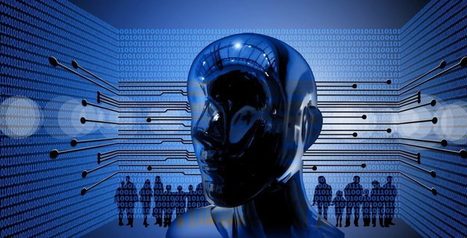

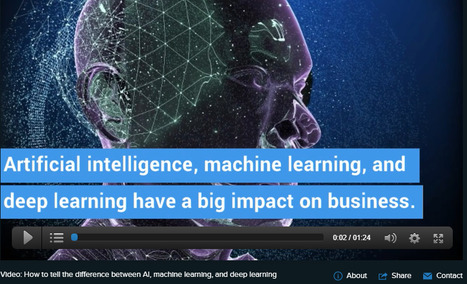

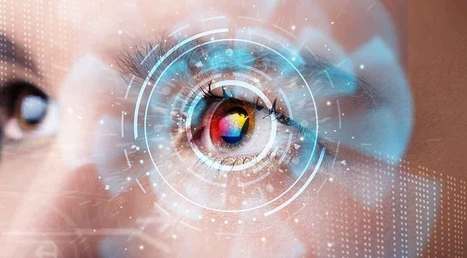







ABOUT THIS PROJECT
This is a robotic owl that looks around for cool people, and can tell whether you're happy or upset. If you're excited enough, he will eventually let you take a sticker (or other small giveaway). He's named Archimedes, after Merlin's familiar in TheOnceandFutureKing. Of course, it's also reminiscent of the cyborg owl in Blade Runner.
First up, if you don't know the Google AIY Vision Kit, check out the details here! This is the basis for the robot's smarts. The code for this project is coming soon.
It started when we were invited to contribute something to the Google booth at Bay Area Maker Faire. I took a really, really long time to figure out what to build—what it would look like, how it would animate, how it would dispense the stickers... in the end, I went with this cute and fairly challenging design.
This robot is versatile enough that I can bring it along to different events, such as the CODAME Artobots Festival and the Arm/Hackster Asia Tour (since the Raspberry Pi runs on an Arm chip, the Broadcom BCM2835). In other words, I can justify spending this much time on one project because I can re-use and iterate upon it. I'm also excited to have a sidekick in the office :)
Learn more / En savoir plus / Mehr erfahren:
https://www.scoop.it/t/21st-century-learning-and-teaching/?&tag=Coding
https://www.scoop.it/t/21st-century-learning-and-teaching/?&tag=Raspberry+Pi